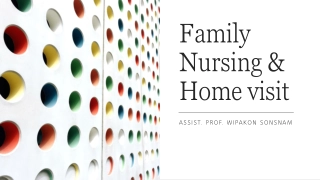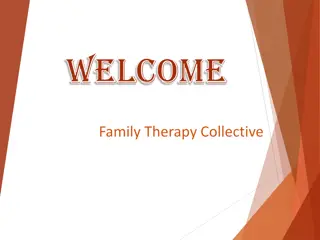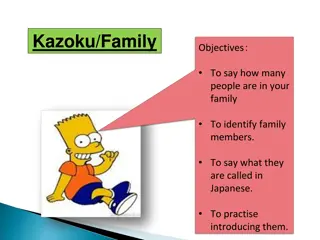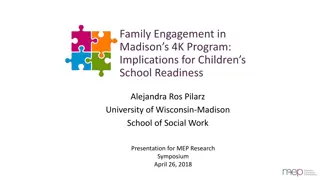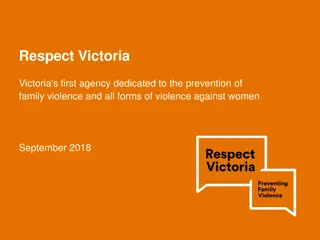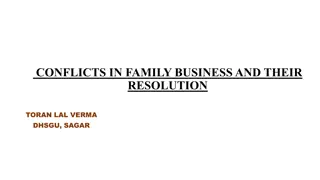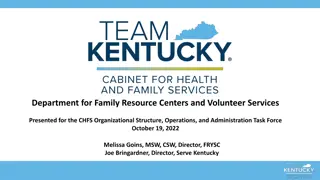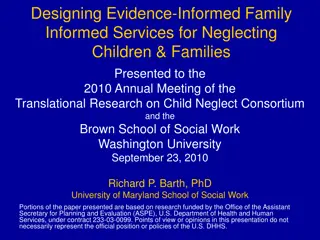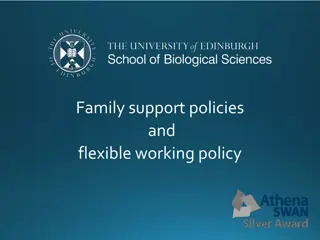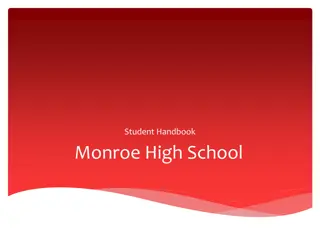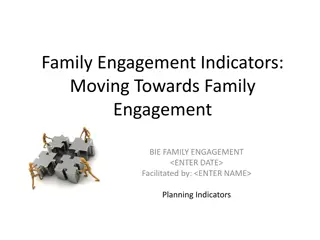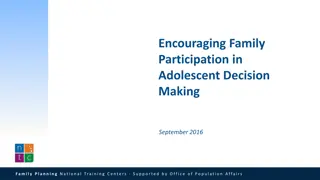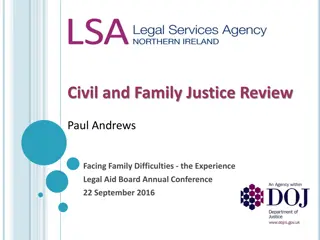
Supports Coordination Services for Individuals of All Ages in Bucks County
Providing supports coordination for over 35 years, our private non-profit agency in Bucks County serves over 10,000 individuals yearly from birth through geriatrics. With a focus on health, safety, and post-school transition planning, we collaborate with schools and families to achieve academic and functional success, offering services that include job coaching, community experiences, and employment objectives.
Download Presentation

Please find below an Image/Link to download the presentation.
The content on the website is provided AS IS for your information and personal use only. It may not be sold, licensed, or shared on other websites without obtaining consent from the author. If you encounter any issues during the download, it is possible that the publisher has removed the file from their server.
You are allowed to download the files provided on this website for personal or commercial use, subject to the condition that they are used lawfully. All files are the property of their respective owners.
The content on the website is provided AS IS for your information and personal use only. It may not be sold, licensed, or shared on other websites without obtaining consent from the author.
E N D
Presentation Transcript
Private, Non-profit Agency Base Service Unit In business for over 50 years Providing Supports Coordination for over 35 years 320 staff Serve over 10,000 individuals per year Provide services from birth through geriatrics
Lenape Valley Foundation contracts with Bucks County for specific services Outpatient, Partial Hospital, BHRS, etc. For individuals with no insurance and no financial resources we are the safety net. Lenape Valley Foundation is accountable to the Bucks County Office of MH/DP for these contracted services.
1116 Consumers, in Bucks, Montco, Chester, and Delaware Counties 30 SCs 6 Supervisors SCs : Locate Services Coordinate Services Monitor Services The Supports Coordinator (SC) works with the individual and their family to write a plan of support describing that person s wants and needs in all areas of their lives including: Health and Safety Important to: Important for:
Transition planning needs to begin earlier than ever age 14-16 Families should prepare for the reality of post- graduation life Collaboration with the school system essential SCs play role in individuals/families getting most out of IEP process Invite SCs to IEP s
Services are: Coordinated set of activities Results-oriented process Focused on academic & functional achievement Facilitate movement from school to post school activities, such as: Post-secondary education Vocational education Adult services Independent living1
Includes: Instruction Related services job coaching, job exploration Community experiences Employment & post-secondary education objectives Beginning at age 16 (or earlier); IEP must include: Measureable post-secondary goals related to employment Transition services to assist the child in reaching those goals1 For IEP meetings SCs need a seat at the table Individual/families should request SC participation JOBS, JOBS, JOBS!
Explore all career areas Complete as many work opportunities as possible Many different types of job opportunities Volunteer Mentoring/internships Start as early as possible Receive benefits counseling Work on independence Work on ability to hold a conversation Be positive about your success get rid of the I can t attitude
Essential skills for success in work environment ISP process help develop ISP outcomes related to soft skills Soft Skills include: Communication skills Enthusiasm & attitude Team work Networking Problem solving & Critical Thinking Professionalism Decision making
Time management Independence Self-advocacy Taking responsibility Leadership Setting goals Prioritizing tasks Having empathy Practicing confidence in ones abilities2
Independent living skills are also essential for post- graduation employment Self-management (unsupervised time) Safety skills Stranger awareness Money Use of public transportation
Volunteer opportunities are important tools for: Self-exploration Career exploration Development of effective work habits Developing soft skills Building ones resume2
Skills include: Advocating for ones needs Asking for help Communicating w/ ones co-workers & supervisors Asking for necessary accommodations2
In PA, must be diagnosed before age 22 IQ versus Functioning Level - IQ is the tip of the iceberg IQ refers to intellectual or cognitive ability Gifted -130+ Above Average - 115-129 Average - 85-114 ID Diagnosis Starts Here: Borderline - 70 (PA requirement is 70 or below) Mild -55-69 Moderate - 40-54 Severe - 25-39 Profound - below 25
Determined by the County MH/DP office 600 Louis Dr, Warminster, PA 18974 215-444-2847 ask for Intake for ID Services Pick a Supports Coordination Organization (SCO) for a list of available agencies. SCO is notified and family is called to set up initial meeting and begin writing the ISP (Individual Support Plan)
www.pawaitinglistcampaign.org As of November 30, 2017 TOTAL PEOPLE WAITING = 13,601 Emergency Needs Category = 4,999 Critical Needs Category = 5,316 Planning Needs Category = 3,286
Opportunity to discuss future planning including employment needs, living arrangements goals, and aspirations Post-graduation planning Concerns: Needs outweigh capacity Cannot necessarily rely on system funding
No Cap Eligibility Must be age 3 or older Have a diagnosis of an intellectual disability, determined via a Full Scale IQ(FSIQ), an Adaptive Behavioral Scale (ABAS) and signed off by a licensed psychologist Intermediate Care Facility (ICF) level of care based on a medical evaluation by a physician Eligible for Medical Assistance $2,000 resource limit if receiving SSI, $8,000 resource limit if receiving SSD Monthly income limit is 300% of the Federal Benefit Rate (for 2017, this is $2,199 for a single individual)
Assistive Technology (lifetime limit of $10,000 and Durable Medical Equipment is excluded) Behavioral Support (21 and over) Companion Care Services (18 and over) Educational Support (must have an employment outcome or other outcome related to skill attainment or development) In Home and Community Supports Home Accessibility Adaptations ($20,000 over a 10 year period) Homemaker/Chore Services Community Participation Supports (formerly known as an adult day program or prevocational services) Nursing Licensed and Unlicensed Residential Habilitation (Community Living Arrangements, Lifesharing, and Supported Living) Respite (this can include overnight respite up to 30 overnights per year, less than 24 hour respite up to 120 hours per year, and respite at licensed and accredited camps as determined by the ACA) Specialized supplies (diapers, incontinence pads that are not covered by insurance) Supported Employment and Advanced Supported Employment Small Group Employment Supports Broker Supports Coordination Therapies (physical, occupational, speech and language, visual/mobility, equine, art and music therapy) Transportation Vehicle Accessibility Adaptations ($10,000 over a 5 year period)
$33,000 Cap What does that provide: Same Services as Consolidated Waiver as long as the total $ remains under the Cap: Community Participation Supports 5 days per week Transportation to and from day program In home and community supports/companion/respite Supported Employment is NOT part of the P/FDS cap, up to $15,000. Supports Broker service is NOT part of the cap.
This is a new waiver, that went into effect 1/1/2018. This has an annual cap of $70,000. What does that provide: Same Services as Consolidated Waiver (with the exception of a CLA), as long as the total $ remains under the Cap.
BASE or County Funding Small $ amounts from the County for people who need services and no waiver funding is available. People that don t qualify for waivers but have needs. TSM or SC Only Individual only has Supports Coordination Usually under 21 years old Meet biannually to plan for future needs. FSS Small $ amounts for things like: Home adaptations Equipment Camp, YMCA, Extracurricular activities In-home respite
Eligibility Be age 21 or older Have a diagnosis of autism spectrum disorder (ASD) Meet Functional Eligibility Must have substantial functional limitations in 3 or more of the major life activities: self-care; understanding and use of receptive and expressive language; learning; mobility; self-direction; capacity for independent living Meet Level of Care (LOC) guideline Meet the income and resource limits for Medical Assistance Financial eligibility is based on 300% of the Federal Benefit Rate Eligibility Criteria: Criteria:
Assistive Technology ($10,000 lifetime limit) Behavior Specialist Services Community Inclusion (assists with teaching ADL s) Community Transition Services (one time financial assistance for an individual moving from an institution into the community, such as a security deposit or moving costs) Day Habilitation Environmental Modifications Family Counseling (limited to 20 hours per year) Family Training Job Assessment Job Finding Nutritional Consultation Residential Habilitation (limited to Community Living Arrangements and Lifesharing) Respite (limited to a cost of $6,000 per year) Supported Employment Supports Coordination Temporary Crisis Services (temporary increase of staff, and limited to 540 hours per year) Therapies (occupational and speech and language) Small Group Employment
Be a Pennsylvania resident Be 18-60 (individuals that are enrolled in this waiver prior to turning 60 then remain enrolled) Individuals who are physically disabled as the primary diagnosis Substantial functional limitations in three or more of the following major life activities: Self-care, understanding and use of language, learning, mobility, self-direction and/or capacity for independent living. Meet the financial requirements as determined by your local County Assistance Office.
Adult Daily Living Services Accessibility Adaptations, Equipment, Technology and Medical Supplies Community Integration Community Transition Services Financial Management Services Home Health Aides Non-Medical Transportation Personal Assistance Services (assistance with ADL s) Personal Emergency Response System (PERS) Respite Service Coordination Supported Employment Therapeutic and Counseling Services
Independence must be fostered at every step Individuals should not be dependent upon their families to navigate the world for them Need to be willing to take calculated risks so that individuals make gains in independence Take Risks and Sometimes Fail Jobs, Jobs, Jobs ISPs should be used as a tool for developing strategies to incrementally increase levels of independence
1ED.gov 2 National Collaborative on Workforce and Disability. Fostering Inclusive Volunteering and Service Learning 3 PA Waiting List Campaign
Bureau of Autism Services PAautism.org 877 877- -231 231- -4244 4244 Bucks County MH/DP 215-444-2800 Office of Long Term Living (Independence Waiver) 1-877-550-4227
Applying for Medical Assistance: https://www.compass.state.pa.us NOVA contact information: www.novabucks.org http://www.mommyslilblackbook.com/
Main # Main # - - 215 215- -345 345- -5300 5300 Cindy Seemiller Cindy.Seemiller@lenapevf.org 267-893-5228 Cindy.Seemiller@lenapevf.org
Thank you

